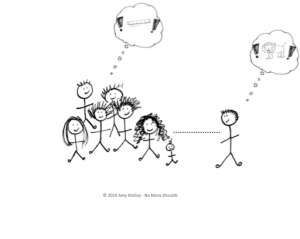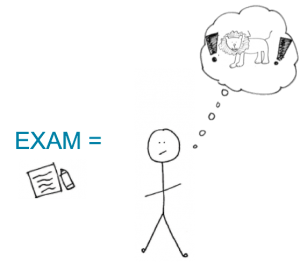This is the final article in our exam preparation series: 6 steps to exam success. Amy Malloy explores the causes of exam day stress and how we can help our students prepare for success through mindfulness.
At the end of the article you’ll find a link to watch a recording of her webinar, which took place on 3rd April 2019.
What are the origins of exam day stress?
There’s no doubt about it – exams are scary. But why exactly is this? What is it about an exam scenario that stresses us out and how can we make it feel okay?
To answer these questions we’re going to have to take a trip back in time and look at how our ancestors evolved their abstract thinking skills. At the same time, we’ll look at how mindfulness can actively help shift the way we think about exams.
About 70,000 years ago, or thereabouts, a key development happened in how the human brain processed experiences.
Over a relatively short space of time (in evolutionary terms), scientists believe we stopped simply experiencing primal urges (safety/hunger/tiredness etc.) and responding to them.
Instead, we started to be able to imagine, analyze and believe in things that didn’t exist. This meant not only could our brains respond to the threat of a real predator in front of us, but also to the perceived or imagined threat of a predator. This shift had really interesting consequences for our future relationship to threat.
Developing imaginations also meant we started to believe in the same things as our peer groups. As a result, if a member of the tribe stopped behaving in a way that supported the tribe’s survival, other members might start to have doubts about his usefulness as a member of the community.
At this time, social isolation meant no share of the food and no protection against predators. Inclusion was directly linked to survival. Essentially the physiological consequences of not meeting societal expectations were the same as coming face-to-face with a lion: fight or flight.
Why is fight or flight mode a problem for exam performance?
Fast forward to the present day and the context of English language exams. Exams are a type of societal expectation: a standard of language proficiency which a student is required to meet to prove their usefulness in a community who speaks that language.
Thinking about it this way, it’s no wonder we can experience stress and panic at the thought of an exam or in the exam room itself. In evolutionary terms, an exam = a lion or the possibility of social exclusion!
Fight or flight mode is designed to help us overcome or get away from danger as fast as possible.
When fight or flight is activated our brain shuts down the bodily functions it doesn’t need to survive. This includes digestion, language creation, creative and strategic thinking, writing, and deeper breathing.
Unfortunately, some of these are key to performing well in a language exam!
Psychologists have identified that, especially in an exam course context, “extremely high stress levels[…] can affect your cognition, negatively impacting both your memory and your ability to complete a task. Over time, chronically high stress levels can also impair your ability to form new memories, so high stress levels all semester long could impact your final exam performance later.”
This means that not only do high stress levels in the exam itself make it hard to perform at one’s best, stress in anticipation of the exam can mean that the content is not learned properly in the first place.
What can teachers do to help?
Ultimately, we want to make the exam scenario seem safe. When our mind and body do not perceive danger, they will allow the ‘rest and digest’ functions to become active and allow our performance to flow.
There will of course be some nerves. But the key is to help the student stay in that sweet spot of clear thinking before the stress takes over and turns into panic.
Here are three ways we can help:
1. Practice mindful breathing
Practice some simple mindful breathing with your students. Mindfulness refers to the awareness that we find by focusing consciously on the present moment, objectively, with compassion and without judgement.
It takes us back into the physical reality of the present moment and out of anxious thought cycles, which can make our stress spiral out of control. Practicing regularly ahead of the exam will help build up neural connections in the brain around the areas which help us relax and stay calmer in the face of stressful situations.
The following very simple routine can be used both regularly at the start of class and by the student in the exam itself if they feel panic rising:
STOP: Take a moment to notice the physical sensation of the chair beneath you and of the floor underneath your feet. Notice the sounds around you in the room and allow them simply to flow in and out without needing to follow them.
BREATHE: Focus your attention gently on your breath going in and out of your nose at the tip of the nostrils. Count ten breaths in and out, seeing if you can notice something new about each one. If you feel panicky, allow the breath out to continue a little longer than the breath in.
WATCH: Become aware of your thoughts and allow them to simply come and go, like clouds across the sky. Notice if you are holding on to something from the past or striving towards something in the future. Allow these to simply release and take your attention back to the breath in the present moment. Count another ten breaths. Then open your eyes and come back into the room.
2. Familiarize your students with the exam scenario
Make the exam scenario as familiar as possible in advance. Anything you can do to make the exam conditions appear less threatening ahead of exam day will be of great benefit.
This may be as simple as making conditions surrounding regular progress assessments as close to the main exam as possible, so it is less strange on the day. If you have control over the exam day itself, make this as low-pressure as possible.
3. Help students develop a growth mindset
Foster a growth mindset with your students by using the word ‘yet’ with them. Encourage them to replace ‘I can’t do it’ with ‘I can’t do it yet’. This simple word takes them out of comparison mode with where they think they should be in terms of language ability and helps them stay focused on where they are, reducing self-pressure.
All of the above strategies are designed to take away the threat of a lion in the exam room when the day comes. Wishing your students all the very best for their exam preparation and good luck!
—
Amy Malloy is a writer and editor, and the founder of No More Shoulds, teaching mindfulness and yoga for healthier, kinder minds.
With 15 years’ experience in teaching, assessment and educational publishing, she now combines this first-hand understanding with certified training in wellbeing practices to help educators and students find inner calm in a stressful world.
You can watch her webinar here.
—
Cambridge exam preparation materials with your students in mind
We offer a range of Cambridge English preparation materials for all ages and levels. Our exam experts, consultants and teachers support the development of our courses to make sure they meet current exam specifications while offering you engaging classroom activities at the same time.
Gold (New edition) 4 levels (B1 – C1)
After speaking to teachers around the world, our best selling course – Gold – has been revised and updated. Full of stimulating, discussion-rich lessons, this four-level series will give your students the confidence they need to pass the B1 Preliminary, B2 First and C1 Advanced exams.
Gold Experience (2nd edition) 8 levels (A1 – C1)
Teaching teenagers? Then Gold Experience (2nd edition) is just what you are looking for. As well as preparing students for Cambridge exams, this engaging course helps students develop a range of 21st Century Skills like debating, critical thinking and creativity.
The second edition is now available from levels A1 – C1.
Expert 3 levels (B2-C2)
Our more intensive course, Expert, helps support ambitious students as they prepare for their B2 First, C1 Advanced and C2 Proficiency exams.
Revised for the 2015 exam changes, the 3rd edition develops language awareness and communication skills as well as test-taking skills.
Practice test plus 7 levels (Pre-A1 – C1)
We also offer a series of practice test books. Full of example papers and exam tips, these are the ideal resource to accompany your course. Now available: A2 KEY for Schools, B1 Preliminary, B2 First, C1 Advanced as well as the Young Learner exams – Starters, Movers and Flyers.
—
Discover our entire exam preparation webinar series and learn how to support your students as they prepare for exams.
The post Reducing exam day stress appeared first on Resources for English Language Learners and Teachers | Pearson English.
from Resources for English Language Learners and Teachers | Pearson English https://ift.tt/2GjVbxv
via Learn Online English Speaking







Comments
Post a Comment